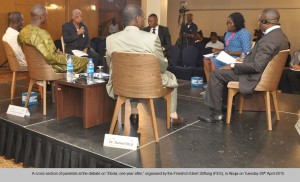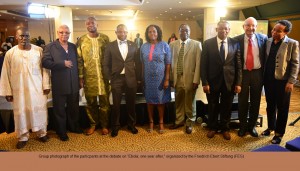|
 Governments in West Africa should improve health governance by scaling up investments in health infrastructure and human capital to ensure proactive responses against pandemics such as Ebola, a panel of discussants on Ebola has recommended. Governments in West Africa should improve health governance by scaling up investments in health infrastructure and human capital to ensure proactive responses against pandemics such as Ebola, a panel of discussants on Ebola has recommended.
The panelists at the debate on “Ebola; one year after,” organized by the Friedrich Ebert Stiftung (FES), in Abuja on Tuesday 28th April 2015, also explained that such investments would engender effective preventive and preparedness initiatives and also address the weak health systems of countries in the region, which suffered the heaviest burden of the latest Ebola Virus Disease (EVD) outbreak.
After a prolonged human and economic devastation, the outbreak has tapered off, but not after claiming some10,000 lives from the more than 25,000 reported cases, with three ECOWAS Member States – Guinea, Liberia and Sierra Leone – as the worst affected.
At the peak of the outbreak, Sierra Leone, which has recorded some 3,000 deaths including 221 health workers, from 8,000 cases, was reporting close to 60 new cases daily compared to about 15 cases a week recently.
Even so, one of the panelists, Mr. Joe Pemagbi, Sierra Leone Country Officer, Open Society Initiative for West Africa, said the country of some six million people, which requires some 3,300 medical doctors, has less than 400 available.
The panel of discussants, which included the ECOWAS Director of Humanitarian Affairs, Dr, Daniel Eklu, the Coordinator, West African Human Rights Defenders Network, Dr. Gadiry Diallo and Dr. Joseph Seka, General Practitioner, Ministry of Environment, Cote d’Ivoire, insisted that West African governments and the populations should not lower their guards in the fight against Ebola.
In particular, they recommended that public education and sensitization as well as community mobilization, participation and vigilance must be sustained until the disease is totally eliminated.
There should also be effective psycho-social support and reintegration programmes for survivors, and children orphaned by the disease.

On external support for the affected countries, ECOWAS representatives on the panel, informed the gathering that the regional organization, was supporting the countries from the Special Regional Ebola Fund, set up by regional leaders.
ECOWAS has also made a strong case for the cancellation of external debts owned by the Ebola affected countries.
In addition, the panelists called for improvement in public and personal hygiene and the strong participation of civil society organizations and the academia in the fight against Ebola.
They also stressed the need for accountability and transparency, both on the part of donors/partners and recipients of assistance, to ensure that financial and technical supports are prudently utilized.
In his introductory remarks, the FES Regional Coordinator, Dr. Klaus Peter Treydte said the interactive debate was the second in the series following the maiden edition on 16th October 2014, as a contribution in raising awareness on Ebola and keeping the phenomenon in the public consciousness.
The other panelists at the talk show moderated by Mr. Chukwuemeka Eze, Executive Director, West Africa Network for Peacebuilding (WANEP), were Mr. Amaechi Alozie, of the ECOWAS Humanitarian Affairs Directorate and Mrs. Helen Nnadozie, Assistant Chief Nursing Officer, Wuse General Hospital, Abuja, Nigeria.
The audience included members of the medical profession, scholars, representatives of government agencies, civil society and media organizations.
Directorate of Communications
|